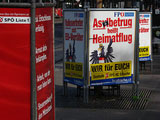The Response to Multiculturalism – Nativism and Populist Politics
21 Dec 2011
Yesterday, the ISN outlined some of the problems Russia has encountered in its attempts to develop a national identity along multicultural lines. The Russian experience reflects that multiculturalists and nationalists are seemingly locked in a competition to provide a coherent national identity that resonates with all sections of society. At stake are the rights to effectively account for a state’s conceptions of sovereignty, culture and indeed interaction with formal mechanisms of global governance. In the case of nationalism, this has resulted in the reinvigoration of political organizations that prioritize history and tradition in their accounts of a state’s national identity. And despite attempts to create a more cohesive European identity, the European Union (EU) is populated by political parties who vigorously oppose multiculturalism and the transfer of power to the supranational level.
Today, we present a external pagemultimedia featurecall_made mapping the spread of nationalist and populist parties throughout the EU. We outline each party’s political objectives, as well as its fortunes at national and European parliamentary elections.
[Resource Embedded:135235]external pageLarge Mapcall_made
In case you have missed any of our previous content on nationalism and the state you can catch up here on: Evolving Ideas of Nationalism, Evolving Ideas of Nationalism II and Nationalism and Multiculturalism in Russia.

